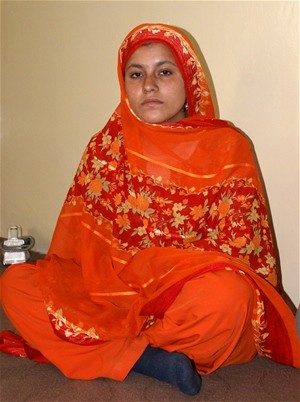
Shah Bibi is one of 18 women selected by their home communities to take part in an 18-month course offered by the Ghanikhail Midwifery Training Center.
USAID/ADP-E
Women trained to become midwives in Afghanistan’s eastern region.
“Before we started working at the Waigal BHC, there were numerous cases of unsuccessful deliveries resulting in either mother or baby deaths. During the seven months I have worked at the clinic, there were only two cases of unsuccessful deliveries.”—Shah Bibi, midwife
13 JUNE 2010 | WAIGAL, NURISTAN PROVINCE, AFGHANISTAN
Afghanistan has one of the highest maternal mortality rates in the world, with an estimated 1,800 maternal deaths per 100,000 live births. Access to reliable maternity and child healthcare is limited in the more remote parts of Afghanistan’s eastern region due to a lack of infrastructure, education, and professional services. The presence of a trained birth attendant can prevent many of the deaths. Together with the Ministry of Public Health (MoPH) and service providers, USAID’s Alternative Development Program – East (ADP-E) has addressed this situation by supporting midwifery training for women from the eastern region’s isolated Nuristan province.
Shah Bibi is one of 18 women selected by their home communities to take part in an 18-month course offered by the Ghanikhail Midwifery Training Center located in Nangarhar Province. During the MoPH- and Jhpiego- (an affiliate organization of Johns Hopkins University) certified training, the women learned a range of both clinical and practical aspects of community midwifery, including prenatal, natal, and postnatal care. The students also learned to assist with normal births, to provide health education to mothers and children during house visits, and to know when to refer women with critical delivery conditions to provincial hospitals.
After certification as a midwife, Shah Bibi began working at the Waigal Basic Health Center (BHC) in her native town of Waigal in Nuristan Province. Traveling long distances into remote mountain villages by car and foot to provide maternal services and deliver babies in an area with a population of 12,000, Shah Bibi and her two colleagues at the center are in high demand.
“Before we started working at the Waigal BHC, there were numerous cases of unsuccessful deliveries resulting in either mother or baby deaths,” Shah Bibi said. “During the seven months I have worked at the clinic, there were only two cases of unsuccessful deliveries.”
In addition to long distances and the need for additional midwives in the area, Shah Bibi faces other challenges. Nuristan has always been an insecure province, with criminal and anti-government elements. In Waigal’s neighboring Kamdesh district, U.S. Forces suffered heavy casualties from attacks on remote outposts. Despite this insecurity, Shah Bibi continues her work with an increased sense of determination.
“Tribal elders have placed importance on my line of work,” she explains. “As a result, the anti-government elements do not target me, and I am granted access to areas under their control in order to provide maternity services to women who have no other access to basic healthcare.”







Comment
Make a general inquiry or suggest an improvement.